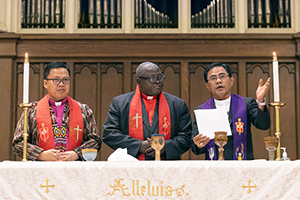Key Points:
- Newly passed legislation guarantees at least five bishops per jurisdiction.
- General Conference 2016 created the Jurisdictional Study Committee to examine the number, boundaries and missional priorities of the jurisdictions.
- “Let’s face it,” Susan Brumbaugh said. “Our membership is changing rapidly, and that formula is no longer serving us well.”
Jurisdictions across the United States will have more say about the number of bishops they need, thanks to new legislation that passed during General Conference.
By May 1 of the gathering, the body had rejected one but passed four of the five petitions recommended by the Jurisdictional Study Committee, eliminating the formula for calculating bishops while guaranteeing at least five bishops per jurisdiction.
Subscribe to our
e-newsletter
General Conference 2016 created the Jurisdictional Study Committee to examine the number, boundaries and missional priorities of the jurisdictions. A diverse group, the committee comprises clergy, laity and bishops from all five jurisdictions.
Lonnie Chafin, Fred Brewington and Susan Brumbaugh presented their report to the body Tuesday, April 30, noting they had concluded the current jurisdictions and boundaries are appropriate as is, and that the jurisdictions themselves are in a better position to assess their need for numbers of bishops.
Key is their assessment that the formula The United Methodist Church had used for calculating bishops in each jurisdiction no longer is an accurate reflection of leadership needs.
“Let’s face it,” Brumbaugh said. “Our membership is changing rapidly, and that formula is no longer serving us well.”
Four legislative items passed Tuesday and Wednesday. Three were included in consent calendars, and one passed on the floor with a 666-43 vote. These did the following:
- Eliminated the formula for calculating bishops in each jurisdiction;
- Established a minimum number of bishops (five) for each jurisdiction;
- Established a process for jurisdictions to request any additional bishops needed, which means those jurisdictions who believe they need more than five bishops can discern the number they need;
- Established that if a jurisdiction wants more than five bishops, the jurisdiction, not the denomination, will pay for those additional bishop costs; and
- Authorized the Interjurisdictional Committee on Episcopacy to receive and act on any requests from jurisdictions for additional bishops.
The one item that did not pass pertained to episcopal office costs. General Conference elected not to remove episcopal office expenses of jurisdictional bishops from the Episcopal Fund apportionment but to retain the current practice of apportioning the office expenses of the central conference bishops. The Jurisdictional Study Committee had wanted annual conferences, not the Episcopal Fund, to pay for these expenses, but the legislation failed on the floor 437-254.
Brodie is editor of the South Carolina United Methodist Advocate.
News media contact: Julie Dwyer at (615) 742-5470 or newsdesk@umnews.org. To read more United Methodist news, subscribe to the free daily or weekly Digests.





